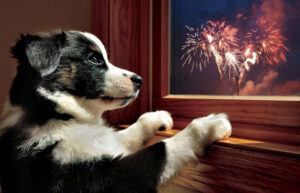Barks Blog
Spook Night, Fireworks and Dogs Don’t Mix!

In the United States, Halloween is widely celebrated and can be a challenge for dogs (see Halloween Hazards for Pets), while here in the United Kingdom, Bonfire night on November 5 is fast approaching – great fun for most of us but not so great if you happen to be a dog! This subject is re-hashed every single year, but I want to deal with things succinctly from a behavioural point of view and specifically of course, from a dog’s viewpoint.
Leave Him At Home!
You know, this is so simple! Yet over the last few years I’ve attended fireworks parties or bonfires, I’ve witnessed people actually walking their dogs to the same event – why? Similarly walking dogs when there are fireworks parties in the neighbourhood. It goes without saying that fireworks are incredibly noisy and encompass crackles, pops, screeches etc. If you can hardly bear the sound, imagine how your dog feels – he can detect sound somewhere in the spectrum of 67-45000hz in comparison to 64-23000hz compared to us, very low frequency and ultrasound. It may appear that your dog is calm, but can you recognise those very subtle indicators of stress? He is very unlikely to be as calm as you think. Don’t forget also that if your dog is already anxious, autonomic nervous system responses (fight or flight) may kick in and he may become loose and bolt, causing a danger to himself and possibly others. It’s just not worth it.
Cute Costumes
Cute for us maybe. There’s loads around, little pumpkins, spiders, bats wings, you name it they’re there. Think about how your dog feels. That passive face isn’t him looking ashamed or embarrassed about what he’s wearing but most likely fearful or anxious about the product on his body and the restriction it is causing, it may even be causing him pain. If your dog is already anxious, simply slapping a contraption on him can be incredibly traumatic.
Things To Help
Ensure He Is Microchipped
Should the worst happen and your pet become lost, there is a means to identify him
Create A Bolthole
Make a lovely den area in a quiet corner and fill with blankets, pillows and toys. Allow your dog to retreat he if he wants to. The idea is that he can snuggle right in and feel safe
Provide White noise
Dog Calming sounds are a great way to provide white noise and are available as downloads over the internet
Block Out Light Flashes
Close blinds and curtains and close windows to prevent and escape artists
Feed Earlier
Feed your dog a little earlier than usual so that his appetite is satiated and he is more likely to settle
Use Activity Toys/Feeders
These can be great, but watch that you choose the right type for your dog as some can be too stimulating. Lick mats and snuffle feeders may be a better option
Comfort Comfort Comfort
Always provide reassurance when your dog is exhibiting fear. Advice to ignore your pet during periods of anxiety is grossly outdated and pretty inhumane
Complementary Therapies
Herbal and neutraceutical products can help. Compression therapy and synthetic pheromone products and massage and touch therapy
Additional Help
If you know that your pet will be excessively stressed. Now is the time to take action. Assistance from a qualified and accredited behaviourist can dramatically reduce the impact on your pet, sometimes with the addition of pharmacological assistance from your vet

